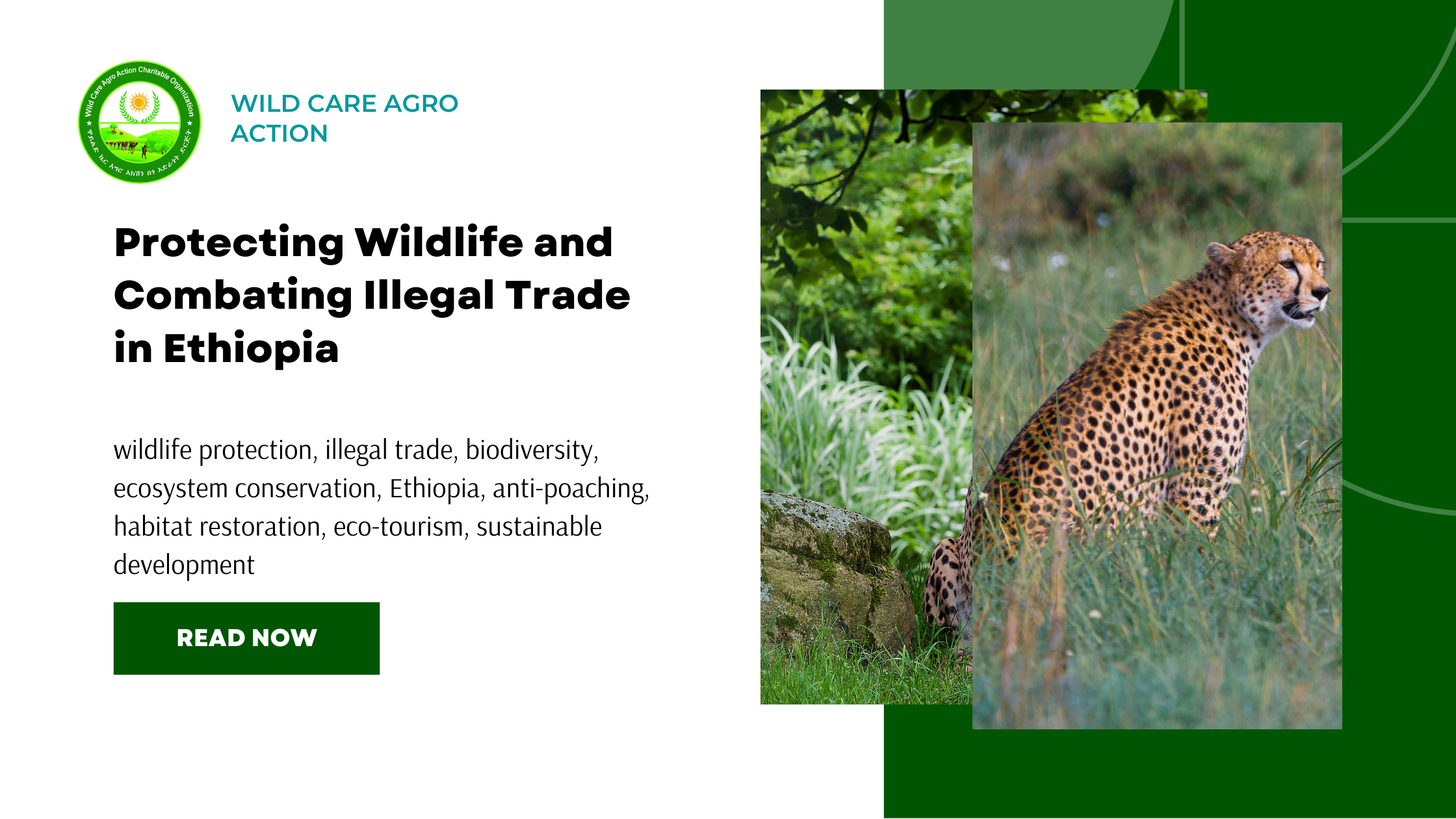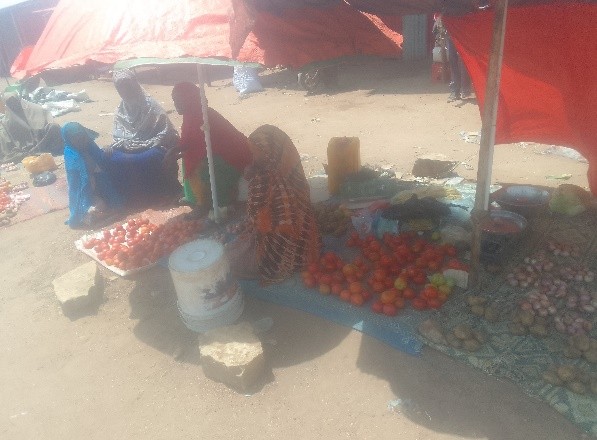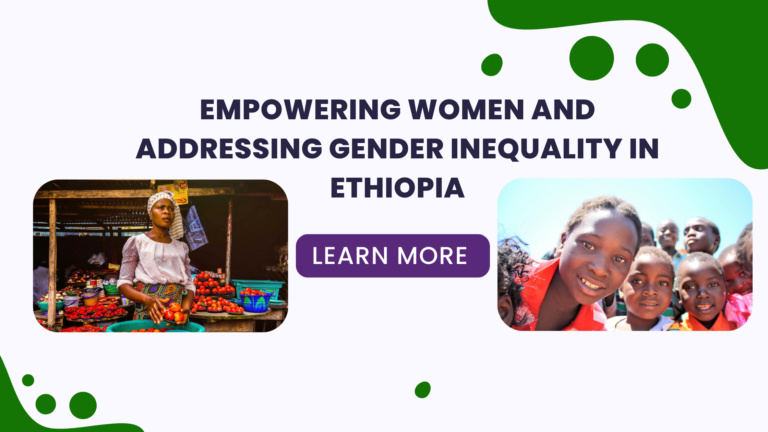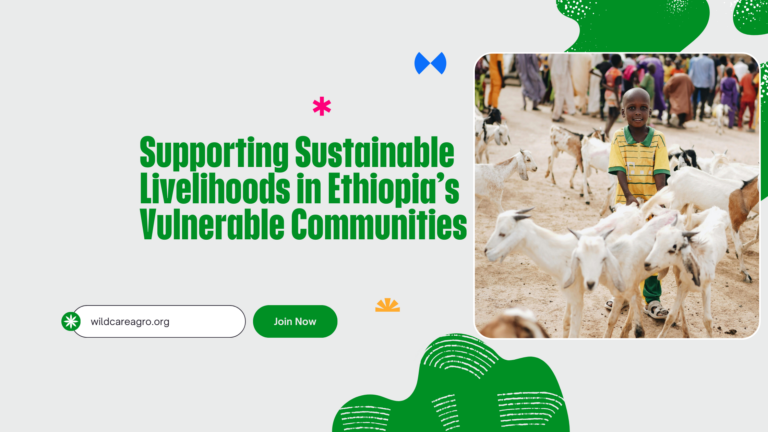Protecting Wildlife and Combating Illegal Trade in Ethiopia

Ethiopia is home to a wide array of wildlife, ranging from majestic lions to endangered species like the Ethiopian wolf. The country’s rich biodiversity and unique ecosystems are vital not only to the environment but also to the well-being of local communities. However, these natural treasures are under increasing threat from illegal wildlife trade, habitat destruction, and climate change. At WILD CARE AGRO ACTION (WCAA), we are committed to safeguarding Ethiopia’s wildlife, protecting ecosystems, and combating the illegal trade in animals and animal products.
This article explores the challenges facing wildlife conservation in Ethiopia and how WCAA is working to protect biodiversity and promote sustainable development.
The Importance of Ethiopia’s Wildlife and Ecosystems
A Rich Biodiversity Under Threat
Ethiopia’s biodiversity is one of the most unique and diverse in Africa. From the Simien Mountains to the Great Rift Valley, the country boasts various habitats that are home to endemic species like the Gelada baboon and the Ethiopian wolf. These ecosystems play a crucial role in maintaining ecological balance, supporting both plant and animal life.
Unfortunately, Ethiopia’s rich biodiversity is under increasing pressure from illegal hunting, deforestation, and habitat destruction. Many of the country’s iconic species face the threat of extinction if immediate conservation efforts are not taken. Protecting these species is not only essential for maintaining biodiversity but also for preserving Ethiopia’s natural heritage.
Ecosystems and Human Well-being
Healthy ecosystems are essential for human well-being. They provide numerous ecosystem services, including water filtration, carbon storage, and pollination, which are vital to agriculture and human health. Protecting wildlife and ecosystems directly contributes to improving community livelihoods, especially in rural areas that depend on these natural resources for their survival.
At WCAA, we believe that conserving wildlife and protecting ecosystems go hand in hand with sustainable development. By safeguarding Ethiopia’s biodiversity, we not only protect its natural beauty but also promote economic growth and community well-being.
The Threat of Illegal Wildlife Trade in Ethiopia
A Growing Problem
Illegal wildlife trade is a global issue, and Ethiopia is no exception. The country serves as both a source and transit point for the trafficking of wildlife and animal products. Endangered species like elephants, lions, and cheetahs are often targeted for their ivory, skins, and other body parts, which are illegally sold in both domestic and international markets.
This illegal trade poses a significant threat to Ethiopia’s wildlife populations, pushing many species toward the brink of extinction. Additionally, illegal hunting disrupts ecosystems, as the loss of apex predators and other key species can lead to imbalances in the food chain, affecting the entire environment.
Economic and Social Impact of Wildlife Trafficking
Beyond the environmental consequences, illegal wildlife trade has severe economic and social implications for Ethiopia. The trafficking of wildlife often fuels organized crime and corruption, destabilizing communities and undermining efforts to promote sustainable development. Furthermore, poaching deprives local communities of potential income from eco-tourism and conservation-related activities.
At WCAA, we are dedicated to combating illegal wildlife trade by working with local communities, government authorities, and international organizations. Our goal is to put an end to poaching and trafficking, ensuring that Ethiopia’s wildlife is protected for future generations.
WCAA’s Efforts in Wildlife Protection and Ecosystem Conservation
At WCAA, we take a holistic approach to wildlife conservation by addressing both environmental and socioeconomic factors. Our programs focus on protecting wildlife, conserving ecosystems, and improving the livelihoods of local communities.
Community Engagement and Education
One of the most effective ways to protect wildlife is by involving local communities in conservation efforts. At WCAA, we work closely with communities living near wildlife habitats, providing education on the importance of biodiversity and the dangers of illegal wildlife trade. By raising awareness about the value of wildlife conservation, we empower communities to take an active role in protecting their natural surroundings.
We also support community-led initiatives that promote sustainable livelihoods, reducing the need for individuals to engage in poaching or illegal trade. By providing alternative sources of income, such as eco-tourism, handicrafts, and sustainable agriculture, we help to create a positive relationship between conservation and economic well-being.
Anti-Poaching Initiatives
Poaching is one of the most significant threats to wildlife in Ethiopia. To combat this, WCAA has implemented anti-poaching programs aimed at stopping illegal hunting and trafficking. We work closely with local authorities, park rangers, and wildlife enforcement agencies to monitor and protect critical habitats. Our anti-poaching efforts include:
- Training and equipping rangers to patrol protected areas
- Supporting the establishment of wildlife sanctuaries and conservation areas
- Monitoring and reporting illegal activities to law enforcement agencies
Through these initiatives, we aim to reduce poaching and ensure that endangered species like elephants, lions, and cheetahs are protected from extinction.
Habitat Restoration and Ecosystem Conservation
In addition to combating illegal trade, WCAA focuses on restoring and conserving ecosystems that are essential for wildlife survival. Habitat loss is one of the leading causes of wildlife decline, as deforestation and land degradation reduce the available space for animals to live and thrive.
We work on reforestation projects, soil conservation, and water management to restore degraded ecosystems. By rehabilitating critical habitats, we provide a safe environment for wildlife to flourish, while also enhancing the livelihoods of local communities who depend on these ecosystems for agriculture and water resources.
Promoting Eco-Tourism as a Conservation Strategy
Eco-tourism is a powerful tool for wildlife conservation and sustainable development. By promoting eco-tourism in Ethiopia’s national parks and wildlife reserves, we create economic opportunities for local communities while raising awareness about the importance of protecting biodiversity.
Visitors to Ethiopia’s wildlife-rich areas can enjoy activities like wildlife viewing, birdwatching, and guided nature walks, all of which generate income for communities and support conservation efforts. Eco-tourism not only provides an alternative to poaching but also fosters a deeper appreciation for Ethiopia’s natural heritage among both locals and tourists.
The Future of Wildlife Conservation in Ethiopia
Building a Sustainable Future
The future of Ethiopia’s wildlife and ecosystems depends on collective action. At WCAA, we are committed to building a sustainable future by protecting biodiversity, combating illegal wildlife trade, and empowering local communities. However, the challenges we face require continued effort and collaboration at all levels.
We believe that with the right support, Ethiopia can become a model for wildlife conservation in Africa. By fostering partnerships with government agencies, international organizations, and local stakeholders, we can achieve lasting results and ensure that future generations can enjoy Ethiopia’s natural heritage.
How You Can Get Involved
There are many ways you can support wildlife conservation in Ethiopia:
- Donate: Your financial contributions help us expand our programs and protect more wildlife and ecosystems.
- Volunteer: Join us in the field or remotely to assist with conservation efforts, education programs, or community outreach.
- Raise Awareness: Share our mission with others and help spread the word about the importance of protecting Ethiopia’s biodiversity.
Together, we can make a difference in protecting wildlife and promoting sustainable development in Ethiopia.



